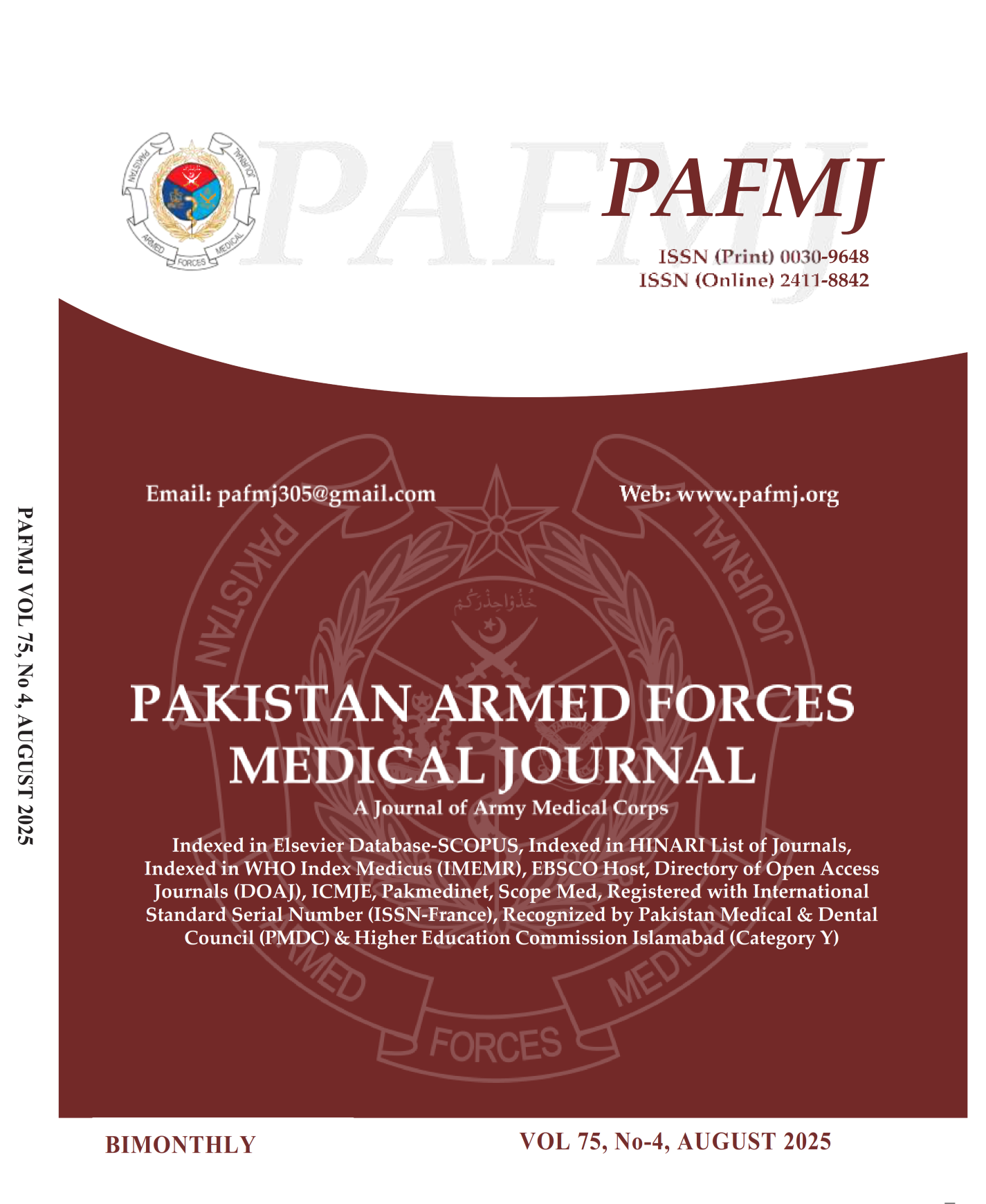Work Related Quality of Life (WRQoL) Survey of Surgical Residents at Tertiary Care Hospital
DOI:
https://doi.org/10.51253/pafmj.v75i4.9735Keywords:
Internships and Residents, Medical Education, Professional Burnout, Quality of LifeAbstract
Objective: To explore work-related quality of life of surgery residents in a Tertiary Care Hospital in Khyber Pakhtunkhwa.
Study Design: Explanatory Sequential Mixed Method study
Place and Duration of Study: Surgical and Allied Departments, Hayatabad Medical Complex Peshawar, Pakistan from Mar to May 2020.
Methodology: Postgraduate residents from surgical and allied specialties were given standard Work-Related Quality of Life (WRQoL) questionnaire. WRQoL scores were calculated for the residents. In the second stage, postgraduate residents with low scores were interviewed until the saturation of data was reached. For quantitative data collection we used convenient non-probability sampling technique and for qualitative data we used the extreme case purposeful sampling technique.
Results: A total of thirty-nine residents submitted a filled WRQoL questionnaire. The mean WRQoL score in our study was 74.82±15.84. A total of 17(43.6 %) residents had low WRQoL scores. Components of WRQoL scores were also studied for each resident. Stress at work (SAW) showed a significant increase in female residents compared to male residents (p=0.003).
Conclusion: More than 43% of the residents in surgery reported low quality of life at workplace. The score is predominantly low in female and junior residents. The major contributor is the stress at work. Significant effort needs to be made to improve the working conditions of surgical residents. This study also opens the way for further work into the burnout of physicians and nurses.
Downloads
References
1. Almailabi MM, Alajmi RS, Balkhy AL, Khalifa MJ, Mikwar ZA, Khan MA. Quality of Life among Surgical Residents at King Abdulaziz Medical City in Jeddah, Saudi Arabia. Open Access Maced J Med Sci 2019; 7(23): 4163-4167.
https://doi.org/10.3889/oamjms.2019.854
2. Puranitee P, Stevens FFCJ, Pakakasama S, Plitponkarnpim A, Vallibhakara SA, Busari JO, et al. Exploring burnout and the association with the educational climate in pediatric residents in Thailand. BMC Med Educ 2019; 19(1): 245. doi: 10.1186/s12909-019-1687-7. Erratum in: BMC Med Educ 2019;19(1):296. doi: 10.1186/s12909-019-1723-7.
3. Howie-Esquivel J, Byon HD, Lewis C, Travis A, Cavanagh C. Quality of work-life among advanced practice nurses who manage care for patients with heart failure: The effect of resilience during the Covid-19 pandemic. Heart Lung 2022; 55: 34-41. https://doi.org/10.1016/j.hrtlng.2022.04.005
4. Lebni JY, Toghroli R, Abbas J, Kianipour N, NeJhaddadgar N, Salahshoor MR, et al. Nurses' Work-Related Quality of Life and Its Influencing Demographic Factors at a Public Hospital in Western Iran: A Cross-Sectional Study. Int Q Community Health Educ 2021; 42(1): 37-45.
https://doi.org/10.1177/0272684x20972838
5. Warr P, Cook J, Wall T. Scales for the measurement of some work attitudes and aspects of psychological well‐being. J occupational Psychol 1979; 52(2): 129-148.
https://doi.org/10.1111/j.2044-8325.1979.tb00448.x
6. West CP, Shanafelt TD, Kolars JC. Quality of life, burnout, educational debt, and medical knowledge among internal medicine residents. JAMA 2011; 306(9): 952-960.
https://doi.org/10.1001/jama.2011.1247
7. Sargent MC, Sotile W, Sotile MO, Rubash H, Barrack RL. Quality of life during orthopaedic training and academic practice: Part 1: Orthopaedic surgery residents and faculty. J Bone J Surg 2009; 91(10): 2395-2405.
http://doi.org/10.2106/JBJS.H.00665
8. Verweij H, van der Heijden FM, van Hooff ML, Prins JT, Lagro-Janssen AL, van Ravesteijn H, et al. The contribution of work characteristics, home characteristics and gender to burnout in medical residents. Adv Health Sci Educ Theory Pract 2017; 22(4): 803-818.
https://doi.org/10.1007/s10459-016-9710-9
9. Zhang Q, Mu MC, He Y, Cai ZL, Li ZC. Burnout in emergency medicine physicians: A meta-analysis and systematic review. Medicine 2020; 99(32): e21462.
https://doi.org/10.1097/md.0000000000021462
10. Zubair MH, Hussain LR, Williams KN, Grannan KJ. Work-Related Quality of Life of US General Surgery Residents: Is It Really so Bad? J Surg Educ 2017; 74(6): e138-e146.
https://doi.org/10.1016/j.jsurg.2017.09.018
11. Easton S, Van Laar D. User Manual for the Work-Related Quality of Life (WRQoL) Scale: A Measure of Quality of Working Life 2018.
https://doi.org/10.17029/EASTON2018
12. Somsila N, Chaiear N, Boonjaraspinyo S, Tiamkao S. Work-Related Quality of Life among Medical Residents at a University Hospital in Northeastern Thailand. J Med Assoc Thai 2015; 98(12): 1244-1253.
13. Kahyaoglu Sut H, Mestogullari E. Effect of Premenstrual Syndrome on Work-Related Quality of Life in Turkish Nurses. Saf Health Work 2016; 7(1): 78-82.
https://doi.org/10.1016/j.shaw.2015.09.001
14. Pereira H, Feher G. Mediating Effect of Burnout on the Association between Work-Related Quality of Life and Mental Health Symptoms. Brain Sci 2021;11(6): 813 https://doi.org/10.3390/brainsci11060813
15. Stehman CR, Testo Z, Gershaw RS, Kellogg AR. Burnout, Drop Out, Suicide: Physician Loss in Emergency Medicine, Part I. West J Emerg Med 2019; 20(3): 485-494.
https://doi.org/10.5811/westjem.2019.4.40970
16. Stewart NH, Arora VM. The Impact of Sleep and Circadian Disorders on Physician Burnout. Chest 2019; 156(5): 1022-1030. https://doi.org/10.1016/j.chest.2019.07.008
17. Cañadas-de la Fuente GA, Albendín-García L, G RC, San Luis-Costas C, Ortega-Campos E, de la Fuente-Solana EI. Nurse burnout in critical care units and emergency departments: intensity and associated factors. Emergencias 2018; 30(5): 328-331.
18. Raudenská J, Steinerová V, Javůrková A, Urits I, Kaye AD, Viswanath O, et al. Occupational burnout syndrome and post-traumatic stress among healthcare professionals during the novel coronavirus disease 2019 (COVID-19) pandemic. Best Pract Res Clin Anaesthesiol 2020; 34(3): 553-560.
https://doi.org/10.1016/j.bpa.2020.07.008
19. Vasconcelos EM, Martino MMF. Predictors of burnout syndrome in intensive care nurses. Rev Gaucha Enferm 2018; 38(4): e65354. https://doi.org/10.1590/1983-1447.2017.04.65354
Downloads
Published
Issue
Section
License
Copyright (c) 2025 Tahmeed Ullah

This work is licensed under a Creative Commons Attribution-NonCommercial 4.0 International License.















